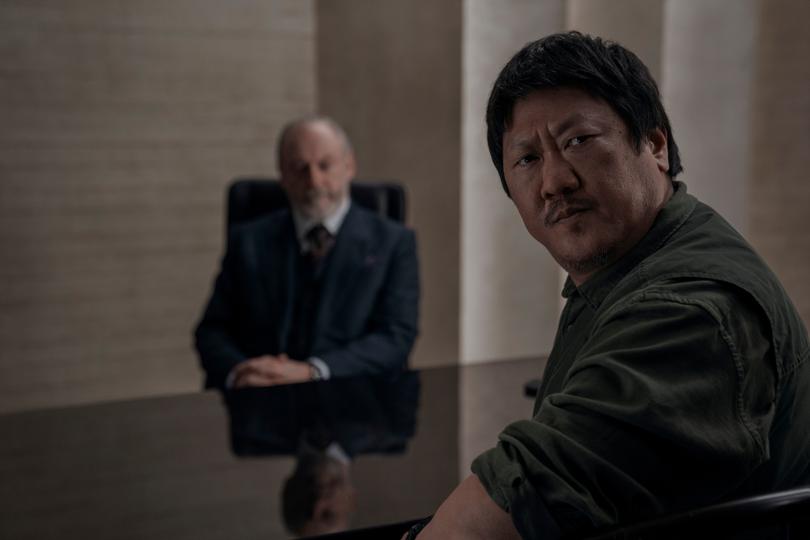REVIEW: 3 Body Problem is a sprawling, ambitious adaptation of Liu Cixin’s acclaimed sci fi trilogy
The Game of Thrones creators may have redeemed themselves with this adaptation of an acclaimed sci-fi trilogy.

If you were being generous, you might say the final season of Game of Thrones was “a bit messy”.
Others might call it a calamity, a ruinous ending that defiled a series that had started so strong. A hyperbolic reaction to be sure, but the mob was baying for blood and demanding the studio remake the six episodes.
Most of that criticism was directed at David Benioff and D.B. Weiss, the writing partners that had adapted George R.R. Martin’s very thick, very involving fantasy novels for the screen.
Sign up to The Nightly's newsletters.
Get the first look at the digital newspaper, curated daily stories and breaking headlines delivered to your inbox.
By continuing you agree to our Terms and Privacy Policy.The common wisdom in the fandom is that once the DBs ran out of source material (Martin’s next book is now eight years overdue), they were out of their depth.
So, there may be some scepticism about them taking on 3 Body Problem, an equally sprawling and high-concept sci-fi trilogy by Chinese author Liu Cixin.
The Hugo Award-winning books were translated into English a decade ago and have a devoted following. And if it helps, that story has already ended, so there’s a clear roadmap.
Despite the kerfuffles at the end, the DBs have proven they are adept at taking a dense story that works in novel form but could be impenetrable on the screen, and weaving all those plotlines and characters into television that makes you want to invest and go down a Wikipedia rabbit hole about astrophysics and 10th dimensions.

3 Body Problem, which debuts this week on Netflix and co-created with Alexander Woo, is good. It’s more than good. It’s great.
The eight-episode first season is ambitious, towering and crammed with big ideas about intellectual curiosity, exploration and our place in the universe while still managing to tell intimate stories about human relationships.
There are two connected timelines in this first season of 3 Body Problem. One is the present day, set predominantly around London on a group of friends who came up through a science program – Jin (Kiwi actor Jess Hong), Will (Alex Sharp), Auggie (Eiza Gonzalez), Jack (John Bradley, GoT’s Samwell Tarly) and Saul (Jovan Adepo).
At the start of the series, their mentor Vera inexplicably jumped to her death but she is only one of dozens of top scientists who have ended their lives in recent weeks. On top of that, particle colliders and other scientific instruments are behaving strangely and physicists are panicking that centuries of knowledge is being unspooled.
Investigating this problem is Da Shi (Benedict Wong), working for a mysterious organisation run by Thomas Wade (Liam Cunningham, another GoT alum).

The other timeline takes place in the 1960s during Mao Zedong’s brutal Cultural Revolution which purged scientists, intellectuals and educational institutions. Ye Wenjie (Zine Tseng) is a brilliant young mind who witnesses her physicist father murdered and is then exiled to a remote, secret radar project.
One night, she slyly makes a decision that would have universe-altering ramifications, which comes to a head in the modern-day timeline.
3 Body Problem has the challenge of intersecting all these different elements and characters, which also includes immersive trips into virtual simulation worlds. The deeper the series goes, the more you want to follow its white rabbit.
It is a demanding series. You cannot half-arse or second-screen watch 3 Body Problem. Cleverly, half of its first two episodes are set in China with Mandarin dialogue so the show forces you to pay attention and read subtitles, which has the effect of sucking you into the overall story.
Plus, there’s a lot of science to wrap your head around. If you don’t understand what they’re saying all the time, don’t feel bad, it all still makes general sense without an advanced degree in applied physics (that’s a thing, right?) or aeronautical engineering.

It’s not easy to ensure a viewer won’t feel stupid because they don’t get the science (this is how you lose an audience) but it walks that tightrope of seeming smart but not off-putting.
You trust the characters know what they’re talking about and even though Gonzalez is as much a “typical hot girl” as Denise Richards was in her Bond movie, Gonzalez’s Auggie is no Christmas Jones.
On a technical level, this is well-made, expensive TV.
The VR worlds are rich and saturated while the real-life environments have the cold-hued menace of slipping into dystopia. But in the smaller moments of human-to-human interactions, there’s a softer, well-worn edge to it, such as when the characters spend time at an English beach house.
And the textured score of Ramin Djawadi is as evocative as his work for GoT and Westworld while episode directors include Hong Kong filmmaker Derek Tsang, who helms the China-heavy episodes, Pixar’s Andrew Stanton (Wall-E) and veteran HBO hand Jeremy Podeswa (GoT, True Detective, The Tudors).
The best sci-fi knows how to connect big ideas with human dramas and that’s what 3 Body Problem does particularly well. Because if you don’t care what happens to the people, then there is nothing to invest in in a high-stakes story.
Rating: 4/5
3 Body Problem is on Netflix from March 21.

